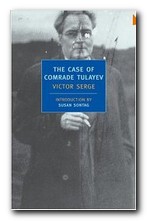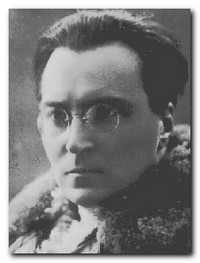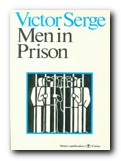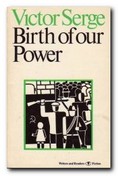the Stalinist purges and show trials of the 1930s
By the time he came to write The Case of Comrade Tulayev Victor Serge had miraculously escaped the worst of political persecution in Europe. He began the novel writing as an exile in Paris, continued it in Marseilles whilst waiting for an exit visa, wrote more in the Dominican Republic, and finished the book in Mexico where he spent the last seven years of his life. His living conditions were impoverished and austere – but it was as if he found the psychological space in which to develop his mature style. All his best work was produced in the last few years left to him, including his autobiography Memoirs of a Revolutionary and his two final novels The Case of Comrade Tulayev and Unforgiving Years.
 Comrade Tulayev has a fluency, a confidence, and a consistency of tone that far surpasses his earlier works. His narrative flows effortlessly from one character and one point of view to another. The most serious political issues are delivered alongside a sensitive apprehension of the everyday world. Tyrants and bullies have moments of doubt and sentimental attachment. Even the heroic figures have flaws and weaknesses, including the most tragic ideological weakness of all – believing that they are making sacrifices in a good cause.
Comrade Tulayev has a fluency, a confidence, and a consistency of tone that far surpasses his earlier works. His narrative flows effortlessly from one character and one point of view to another. The most serious political issues are delivered alongside a sensitive apprehension of the everyday world. Tyrants and bullies have moments of doubt and sentimental attachment. Even the heroic figures have flaws and weaknesses, including the most tragic ideological weakness of all – believing that they are making sacrifices in a good cause.
There is also a powerful thematic unity to the novel. It reveals the deprivations suffered by millions in the world’s worst ‘planned economy’; it reveals the bureaucratic corruption that created the shortages, waste, and even famines; and it dramatises magnificently the ideological struggles between those old Bolsheviks who had sacrificed everything to create a better society, and the New Men who had taken over to betray their efforts.
At the height of the Stalinist terror in the late 1930s a petty clerk Kostia shoots Central Committee member Tulayev almost on a whim – just because he happens to have acquired a gun. This sets in motion a new wave of purges which percolate all the way through Soviet society. Government officials are arrested; oppositionists and critics of the Party are jailed; there are mass arrests of ‘wreckers’ and ‘saboteurs’. None of these people have done anything wrong: the paranoid madness of Stalinism merely requires guilty victims. All of these people realise that no matter how long their torment lasts, their future is either years in the GULAG or a bullet in the back of the head.
Serge’s great achievement is to show how people from the top to the bottom of Soviet society coped with the terror of the purges. But most especially, he is keen to reveal how former Bolshevik loyalists managed to persuade themselves, when charged with all sorts of crimes they did not commit, that they were agreeing to confess in order to serve a greater good. That is, they put the Party above everything. And the circular logic of the Party’s argument is brilliantly compressed into the expression “obey or betray”. It’s what we might now call a Catch-22 situation. You can help the Party achieve its ends by agreeing to your own guilt (and death) or you can resist, and die anyway. In the first case, your sacrifice will help us; in the second, you are besmirching everything you have worked for over the last twenty years.
The flaws in this argument are now well known. The Party was certainly not any guide to sensible policy: it was liquidating its best intellectuals, scientists, engineers, and even military leaders just when it needed them most. It did not represent the working class on whose behalf its claims were made, because it was a corrupt bureaucracy. And the democratic principles to which it appealed were a complete sham. The entire system of government in the Soviet system was based on lies, fabrications, corruption, injustice, falsified statistics, inefficiency, and terror (which is why it eventually collapsed in 1989). But at the time Serge was writing not many people were aware of the gigantic gulf between propaganda and reality. Many writers in the west swallowed the Soviet propaganda wholesale. Sidney and Beatrice Webb, (The Truth About Soviet Russia, Soviet Communism: A New Civilization) are now risible museum pieces, though many at the time took them seriously.
Each of the principal characters in the novel is shown grappling with the central problem in his own way. Makayev a dull and brutish peasant rises through the ranks to become a local leader because of his willingness to do the party’s bidding; but he has no intellectual or moral reserves when he finds himself on the wrong side of the investigation. Even the investigators themselves fall under the wheels of the Juggernaut – because failing to deliver results is branded as counter-revolutionary and ‘sabotage’. Old Bolshevik Ryzhik is dragged back from an unimaginably severe and miserable life in exile beyond the Arctic Circle, and faced with the same accusations as everybody else. He chooses to thwart his captors by starving himself to death in jail.
Even foreign policy is affected. Kondratiev, a loyal Soviet agent working in Spain in the middle of the civil war is swept up into the madness. His job is to eliminate Stalin’s rivals whilst appearing to support the Republican movement. Recalled to Moscow and invited by Stalin himself to give a truthful report on events, he does so – and although branded as a Trotskyist sympathiser and expecting every moment to be jailed and shot, he is one of the rare examples of someone ‘spared’ because of his old links with Stalin. He is merely banished to a Siberian mine.
No such luck for Xenia, the daughter of prosecutor Popov who is on an official visit to Paris. On hearing that the incorruptible old Bolshevik Rublev has been accused, she makes a vain series of attempts to have messages of support sent back to Moscow. This alerts the secret service agents who are already spying on her activities, and she is taken back to Moscow under arrest. And because they are related, her father is arrested too.
The show trials take place, the accused are convicted, and the episode has what we now call closure. The three principals Erchov, Makeyev, and Rublev (who have absolutely nothing to do with each other) meet their death, and the corrupt system that has brought this about goes on. Even when the original assassin writes a letter to the prosecutor confessing his guilt, the letter is destroyed – because it compromises the Case, which has now been closed.
The novel is tragic in the very best sense. It shows enlightened and courageous individuals inspired by noble ideals who are brought to a pitiable end by ideological flaws in the system they embrace. It offers a first-hand account of the Soviet system written by somebody who was a high-ranking insider. And most important of all it reveals the secret mechanisms of the the Terror and the Show Trials which were at the time a baffling mystery to everyone. We have known the technical details for over seventy years now, but the artistic truth offered by a magnificent novel such as The Case of Comrade Tulayev lives on forever.
© Roy Johnson 2010
Victor Serge, The Case of Comrade Tulayev, New York: New York Review Books, 2004, pp.362, ISBN: 1590170644
More on Victor Serge
Twentieth century literature
More on biography
 Victor Serge (1890-1947) wrote under the most difficult conditions, much of the time whilst living in exile – in his adopted homeland Russia, in France, and in Mexico. He frequently had to write in secret and he smuggled his work out of the Soviet Union to be published in France and Spain. His work was banned throughout the communist period in Russia, and it has only recently become available there. It also has to be said that his work goes in and out of print rather a lot in English-language publications. A gifted linguist, he chose to write in French. Besides being the preferred language of Russian intellectuals of his generation, French assured him an international audience.
Victor Serge (1890-1947) wrote under the most difficult conditions, much of the time whilst living in exile – in his adopted homeland Russia, in France, and in Mexico. He frequently had to write in secret and he smuggled his work out of the Soviet Union to be published in France and Spain. His work was banned throughout the communist period in Russia, and it has only recently become available there. It also has to be said that his work goes in and out of print rather a lot in English-language publications. A gifted linguist, he chose to write in French. Besides being the preferred language of Russian intellectuals of his generation, French assured him an international audience.


